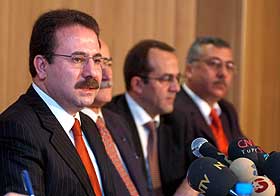Limits on Kurdish movies and music lifted

Tuesday, June13,2006
ANKARA - Turkish Daily News
The Supreme Board of Radio and Television (RTÜK) has lifted a limit of 45 minutes daily and four hours per week imposed on Kurdish broadcasts of cultural shows.
According to the decision those television stations that have permission to broadcast in Kurdish can run movies and concerts beyond the time allocated, but the limitation still stands for news programs and discussion shows. The decision was taken unanimously by the RTÜK board.
While television and radio channels will not be bound by time limitations when it comes to concerts and movies, they will still have to use subtitles for all programs.
The RTÜK decision does not allow these stations to broadcast 24 hours a day. Licenses to broadcast only movies or music are not available, and the license provided does not allow continuous broadcasting in Kurdish.
The owners of television stations that broadcast in Kurdish had complained that they were finding it difficult to fill 45 minutes a day with only news but noted that if they wanted to broadcast movies or concerts, the allotted time was not sufficient.
Broadcasts finally began on March 23.
Two private regional television channels and a radio station started brief Kurdish-language broadcasts for the first time in Turkey on March 23 of this year.
Executives from Gün TV, Söz TV and Medya FM, all based in the Southeast, signed a deal with Turkey's broadcasting watchdog. The existing laws limit the broadcasts to 45 minutes a day and four hours per week for television stations and one hour a day and five hours per week for radio stations. They also require broadcasters to run subtitles in Turkish, which some criticize as causing too many technical difficulties.
Under pressure to comply with European Union democracy norms, Turkey began Kurdish-language broadcasts on state television in 2004, a taboo-breaking move in a country where even speaking Kurdish was banned less than 15 years ago.
As part of EU-oriented reforms, Parliament in 2002 also granted limited rights for Kurdish to be taught at private language institutions. Although Kurds at first welcomed the schools, they have since closed because of dwindling interest and Kurdish demands that the language be part of the regular school curriculum. Turkish nationalists are opposed to increased cultural rights for the country's estimated 12 million Kurds, fearing that it would embolden separatists. Turkish soldiers have battled Kurdish militants in the Southeast since 1984, a conflict that has left 37,000 dead. There has been a recent surge in violence.
Roj TV: Many Kurds watch the Denmark-based Kurdish satellite television Roj TV. The Turkish government is pressuring Copenhagen to close down the station, saying it is a mouthpiece for the outlawed Kurdistan Worker's Party (PKK), which Turkey , the United States and the EU consider to be a terrorist group. Turkey's previous failure to allow television stations to broadcast in Kurdish had resulted in no alternative to Roj TV in the Southeast.


<< Home